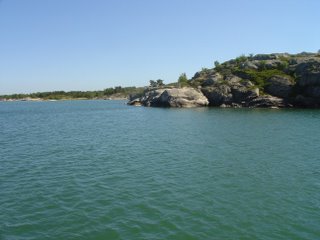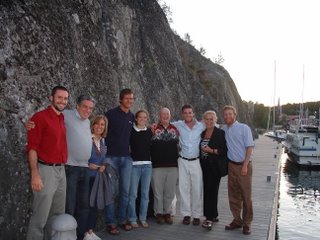June 24, 2006
Ship’s Log
June 24, 2006
Departure Location: Korpo, Finland
Departure Time: 11:00 hours
Distance Traveled: 32.19 nautical miles
Arrival Location: Lappo, Finland
Arrival Time: 18:00 hours
Weather: Sunny, steady breeze from the south/southwest
Personal Comments:
After a late start the ship battled an upwind course for the first two hours, before the direction changed and the boat was able to maintain a consistent downwind heading roughly 15-20 knots of breeze. We have finally drifted back into the Aland islands and are now out of Finish territory.
Although we were unable to land on the island Vinci identifies as Apollo island (Applö in Swedish) due to shallow water and rocks, we were able to skirt it. This gave us the opportunity to film Bill reading a passage from Book I of the Iliad, which shows how central Apollo is to the plot of the Iliad and how he is worshiped on various sacred islands.
We arrived at Lappo in late afternoon along with many of the same boats that had been in Korpo with us during midsummer celebrations the night before. To add variety to our activities, and take a night off from dishes and cooking, we opted to eat dinner at the one restaurant near the harbor. We also felt it necessary to treat our captain to a nice meal in order to console him after Sweden’s elimination from the World Cup.
Finally in an attempt to cleanse ourselves of our midsummer fun we ended the night with our second sauna of the trip. Being far hotter and smaller than the last this sauna it was more up to Jonas’ standards, and afforded him the opportunity to pass on his sauna knowledge.
Important Sauna Info.
1. To annoy your neighbor blow on their skin. This will cause an intense burning sensation.
2. All real saunas should contain a short bundle of birch branches to be used for cleansing purposes. One may only cleanse themselves with the birch bundle, never their neighbor. Cleansing is accomplished by using the bundle to whip ones back with water.
3. To add a lovely fresh bread scent to your sauna add a splash of beer to the bucket of water used to wet the rocks (watch out Martha here we come).
4. The following rule is top secret and as of yet unwritten so feel privileged in being the first to OFFICIALLY read it. If you put water on the rocks you must remain in the sauna until someone else applies water, OR the heat wave resulting from the water has dissipated. Splashing water on the rocks and then immediately leaving is considered rude and a mark of inexperience.
5. After sufficient sweating one should jump into ice-cold water (preferably outside, but a shower will do) to close the pores and complete the cleansing process.
Having enjoyed the sauna so thoroughly last night Bill has now begun calculating the cost and possibility of building his very own.
More details to follow…
Research Comments:
Today we skirted our way around three quarters of Applö Island, a name whose similarity to “Apollo” Vinci notes on p. 165. The name Applö raised questions regarding the possible range of etymologies for a given place name. Jonas, when asked about the translation of the name Applö, said that it was plausible it could simply mean Apple Island (äpple plus –ö, the word for ‘island’ which is commonly the second half of island placenames in Swedish), and anecdotally added that many Swedes grow apple trees in their gardens. This made us see the utility in creating a taxonomy of the different kinds of names Swedes and Finns give to their places and the multiple translations each name could have. Before assuming an ancient Greek root in place names, as Vinci does in the case of Applö, it is necessary to ask whether the place name consists of a word or words that are intelligible in contemporary language (i.e. Applö as simply Apple Island). If Applö were in fact Apple Island it would raise the question of how many of Vinci’s other proposed homotopes could be explained with more recent etymologies. Such explanations need not totally rule out his conjectures about earlier meanings, since linguists routinely deal with what they call “folk etymologies,” a process by which an earlier root, no longer intelligible, is interpreted in terms of a more recent word to which speakers of the living language can relate.
However, even if more modern interpretations of homotopes do exist, Vinci bases his argument on a larger contextual vision based on highly specific geographical and topographical details to be found in the Homeric description of locations. Therefore, while place names and their etymologies are significant, they are not the hinge point of his theory. Hundreds of homotopes, having plausible Greek etymologies and also having a closer fit to the Homeric text in the Baltic rather than the Mediterranean, constitute strong evidence in support of a Baltic location for the Iliad and Odyssey.
Part of the reason that Apollo is so important in Vinci’s argument is that he is one of the few ancient Greek gods whose cults and myths explicitly reference life in the far north. Apollo is said to live part of every year (the winter months) “beyond the north wind” in a place characterized by constant spring and carefree days full of festivals. Vinci theorizes that Apollo’s home may represent the collective cultural memory of a time when that subset of the Indo-Europeans which he places in the Baltic region may have lived even farther north at the height of the Post Glacial Climatic Optimum (for Vinci’s description see pg. 290). It was only as the climate started to turn that they would have moved south; settling for one phase of several centuries in the Baltic region before a further subset of them migrated south (along the same routes as the Vikings and many others later) and finally established themselves in the Mediterranean.
Professor Dmitri Panchenko, a well-known classicist at Bard’s sister college, Smolny Institute, in St. Petersburg, Russia, was spending this semester as a guest at the Helsinki Collegium and so was able to meet Professor Mullen (with whom in Spring 2005 he had team-taught by videoconference a Bard/Smolny Virtual Campus course on “Cosmology and Ethics in the Axial Age” in Helsinki and discuss Vinci’s theory in relation to his own recent work. The next day he forwarded an article (available online) he recently wrote about the connection of Apollo and the Hyperboreans with his own variant thesis of a Northern origin for Greek civilization. Professor Panchenko’s article, although it takes a different approach than Vinci’s theory, is remarkable: it too posits a nexus between the cults and myths of Apollo, the cults and myths of the Hyperboreans, and theories connecting Greek civilization with a northern origin.
Apollo as the god most central to the plot of the Iliad, has, in these last few days, come together in our travels with Apollo as the god most closely associated in ancient Greek memory with memories of a land in the far north which once had a far milder climate. From Toija = Troy and Tenela = Tenedos to Applö = Apollo and Delet = Delos, principal pieces of Vinci’s puzzle have been assembling themselves before our eyes.



1 Comments:
One way to solve many of the problems that exist in todays chronology, especially those problems that involve "dark ages", is, mainly, to eliminate them!
Certainly it is very hard for most of us to accept that during the period of ca.1200 BCE to ca. 800 BCE, the area we know call Greece was buried under a "dark age" that left "no remains" of any consequence, even writing is or was thought to have been lost!
Lost, that is until that old blind bard Homer, had the audacity to claim he had memorized all of what would amount to over 800 written pages, of an account that was over 400 years removed from his own times!
Vinci's, and your comparisons to the "latter" movement of the "Vikings" also strikes a chord, if you are able to consider that the period described by Homer, was really the Viking / Northmen period!
If you are interested see;
http://www.revisedhistory.org/forum/
Regards,
Ron
Post a Comment
<< Home